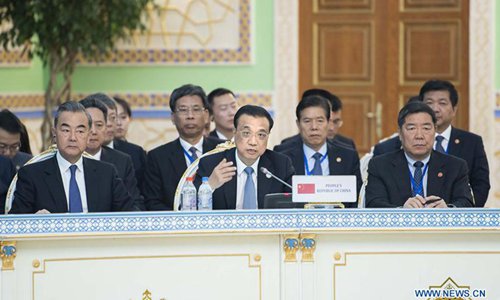
Premier Li Keqiang (center) attends the 17th meeting of the Shanghai Cooperation Organization Council of Heads of Government in Dushanbe, Tajikistan, on Friday. Li is expected to visit the Netherlands and Belgium after the meeting. Photo: Xinhua
Chinese Premier Li Keqiang's visit to the Netherlands and Belgium comes at a key turning point in the global governance system and will showcase China's and Europe's resolution in resisting US unilateralism and trade protectionism through deeper bilateral and multilateral cooperation, Chinese observers said on Sunday.
Premier Li is expected to visit the Netherlands from Sunday to Tuesday, before visiting Brussels, Belgium and attending the 12th Asia-Europe Meeting (ASEM) Summit.
Vice Foreign Minister Wang Chao said at a press briefing on Tuesday that the visit would further enhance political trust and pragmatic cooperation, and inject new impetus into Dutch, Belgian and European ties with China.
Calling China and the EU "important economies" and "significant strategic powers" in the world, Wang said that they share common interests and similar positions on championing free trade, multilateralism and global governance, the Xinhua News Agency reported on Tuesday.
At a time when the US is abandoning the world order represented by the UN and promoting unilateralism and anti-globalization, it's important that China and the EU, two major powers, jointly resist the US move and protect multilateralism, Zhao Junjie, a research fellow at the Chinese Academy of Social Sciences' Institute of European Studies, told the Global Times on Sunday.
"Li's visit will better connect the China-proposed Belt and Road initiative with EU development strategies and come up with more trade facilitation measures," Zhao said.
Cui Hongjian, director of the department of European studies at the China institute of international studies, told the Global Times on Sunday that the Netherlands and Belgium epitomize those European countries that rely on foreign investment due to their small domestic market. Thus for these countries, free trade and multilateralism are necessary, he said.
"China's strengthened ties with the Netherlands and Belgium could help form a force within the EU to boost cooperation between China and other EU members," Cui said.
China and the EU must manage their relations with the US, Cui warned, as deteriorating relations would inevitably affect a third party.
Bilateral cooperation
Li is making his first official visit to the Netherlands as Chinese premier. Former premier Wen Jiabao visited the Netherlands in 2004, the last official visit by a Chinese premier.
China is the second-largest trading partner of the Netherlands outside the EU and the Netherlands is China's third-largest trading partner within the EU, Xinhua reported on Saturday.
In 2017, bilateral trade hit $78.6 billion, setting a new record, said Xinhua.
"The visit is likely to see strengthened cooperation between China and the Netherlands in fields including agriculture, health, e-commerce, logistics and intelligent manufacturing," Zhao said.
The Netherlands' direct investment in China reached $2.1 billion in 2017, leading the EU, while China's $22 billion investment in the Netherlands was also first among all EU members by the end of 2017.
As the political heart of Europe, Belgium can signal growing opposition to unilateralism by cooperating with China, Zhao said.
International organizations have headquarters in Brussels and major Chinese companies including Huawei, ZTE Corp and Geely Automobile Holdings have Brussels branches.
"China and Belgium may deepen cooperation in the chemical, environmental and microelectronics industries," Zhao said.
To resist US unilateralism, China and the EU have to agree on long-term cooperation in fields such as automatic driving and artificial intelligence, Cui noted.

